 Petzlover
PetzloverHavanese is originated from Cuba but Toy Schnauzer is originated from Germany. Havanese may grow 8 cm / 3 inches shorter than Toy Schnauzer. Both Havanese and Toy Schnauzer are having almost same weight. Both Havanese and Toy Schnauzer has almost same life span. Both Havanese and Toy Schnauzer has almost same litter size. Havanese requires High Maintenance. But Toy Schnauzer requires Moderate Maintenance
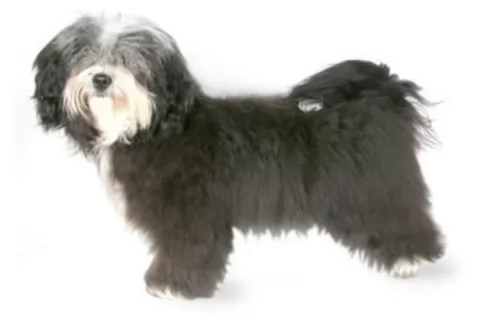 The only breed of dog that is native to Cuba is the Havanese. These little dogs are great companion animals. Sociable and happy, they are very popular in the United States with urbanites. These happy little pups are a Bichon type of dog which was developed from the “Little White Dog of Havana” or the Blanquito de la Habana which is now extinct.
The only breed of dog that is native to Cuba is the Havanese. These little dogs are great companion animals. Sociable and happy, they are very popular in the United States with urbanites. These happy little pups are a Bichon type of dog which was developed from the “Little White Dog of Havana” or the Blanquito de la Habana which is now extinct.
The Blanquito de la Habana was itself developed from another extinct breed the Bichon Tenerife. Then the Blanquito was bred with the other Bichons and poodles in developing the Havanese. It is believed that some of the first people to settle in Cuba were from Tenerife, an island close to Cuba. In the early part of the sixteenth century, little white dogs were brought to Cuba with these settlers. This dog of Tenerife is believed to be the ancestor of all Bichon breeds.
At that time trade with Cuba was highly restricted by the Spanish and so these dogs developed without any crossing from other breeds from outside the country. They grew to be able to stand hot temperatures and they grew a very unique coat – almost like silk. Their coat is soft and light, while insulating them from the tropical environment.
At this time Cuba was the place to be for Europeans aristocrats on vacation. Unlike the British colonies, Cuba had theatres, operas and palacious. When going back to Europe, many took this little white dog with them to France, Spain and England. The Dog of Havannah was a favorite on European soil as well. Many of these dogs taken to Europe were fawn or parti instead of white. Meanwhile back in Cuba, the bourgeoisie were replacing the aristocracy who themselves would soon be replaced by the Revolution.
During the days of the bourgeoisie, the Havanese became very popular household pets. The breed has been a family pet for the last 150 years. At the same time the breed was very trendy in Europe with Charles Dickens and Queen Victoria owning several. They were by now familiar participants in Europe’s dog shows. Finally, with the Revolution, the bourgeoisie left the country in droves with their little white dogs. A genetic pool was then formed in the US. Gene pool from 11 dogs. All the Havanese in the world are descended from those 11 dogs with the exception of the dogs isolated in Cuba and the US. Today the Havanese is one of the most popular and fastest growing breeds in the world.
The Miniature Schnauzer was actually a distinct breed as early as 1899. It is believed that the dog came from breeding the smallest Standard Schnauzers with Affenpinschers, Black Poodles, and the gray Spitz.
Miniature Schnauzers were registered as a separate breed in 1926. The Toy Schnauzer is registered as a Miniature Schnauzer but is actually a little bit smaller.
The Miniature Schnauzer was developed as a farm dog with the purpose of killing rats.
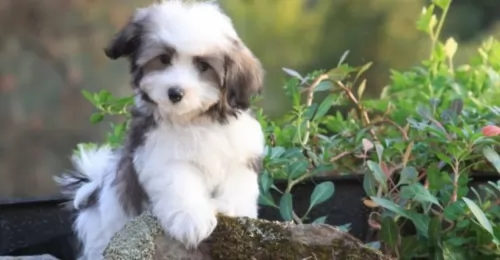 The Havanese is a sturdy little dog, a member of the toy group. They weigh no more than 16 pounds (7.3kg) and his body is longer than it is tall. The breed has a unique topline that is not level, but it is straight. His front legs are longer than his hind legs producing the lively gait everyone is used to seeing with a Havanese. With a full muzzle that tapers to the nose, the Havanese does not seem to be short. The skull’s length is the same as the muzzle’s. The head of the Havanese is round in the back and flat in the front.
The Havanese is a sturdy little dog, a member of the toy group. They weigh no more than 16 pounds (7.3kg) and his body is longer than it is tall. The breed has a unique topline that is not level, but it is straight. His front legs are longer than his hind legs producing the lively gait everyone is used to seeing with a Havanese. With a full muzzle that tapers to the nose, the Havanese does not seem to be short. The skull’s length is the same as the muzzle’s. The head of the Havanese is round in the back and flat in the front.
They have a deep chest, almond shaped eyes that are dark brown and their ears are about halfway down the nose. The long ears hang down the side od the face. They have a long plumed tail that is held high and upward. The standard for the breed and now the laws of the United Kingdom state that there can be no docking of the tail.
The Toy Schnauzer is a small dog standing at between 33–35cm tall and weighing about 4 to 9 kg.
He has medium length hair which is hard and wiry and which requires minimal grooming. These low-shedding dogs make the ideal family pets for those people who have allergies.
Colors of the coat are essentially black and silver, chocolate or a salt and pepper look. You'll find they have a beard and bushy eyebrows, giving him an almost human-like expression.
These dogs were brought about to be all-around farm dogs and ratters and they are tough, muscular, and fearless without being aggressive.
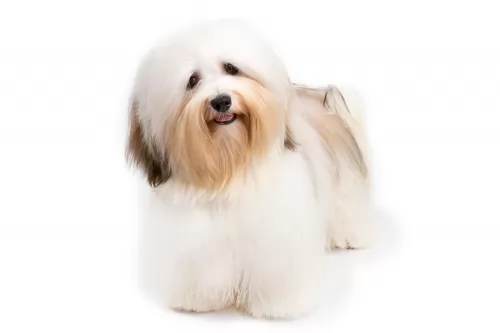 Havanese are highly intelligent and eager to please, and they are easily trained so long as you use only positive methods. This can be a sensitive breed, so care must be taken to not scold them harshly. Socialization from an early age is very important. Expose them calmly to a wide variety of new places and new people, always ensuring that the experiences are positive and not intimidating. Gentle, patient training will result in a wonderful companion dog. They are affectionate with people and get along with other nonaggressive pets.
Havanese are highly intelligent and eager to please, and they are easily trained so long as you use only positive methods. This can be a sensitive breed, so care must be taken to not scold them harshly. Socialization from an early age is very important. Expose them calmly to a wide variety of new places and new people, always ensuring that the experiences are positive and not intimidating. Gentle, patient training will result in a wonderful companion dog. They are affectionate with people and get along with other nonaggressive pets.
The Havanese is the consummate lap dog. Over time they have become the lovable family companion.
The breed is pretty adaptable being able to live as a companion animal in almost any setting. Just don’t expect your Havanese to go hiking or romp with you on 40 acres in the country.
They are intelligent, love to learn but can be a little stubborn. Train them early as they like their habits and its much harder to train an older Havanese.
The Toy Schnauzer is spunky, strong-willed and confident. They all have different personalities and while some people report they are aloof, stubborn and uppity, others say they are playful, friendly and amicable.
A lot depends on the owners as dogs often develop the temperaments of the owners.
With this range in temperament, you can’t say with certainty how your Toy Schnauzer will turn out. Most of them just want to be involved with their human families and they make great family pets.
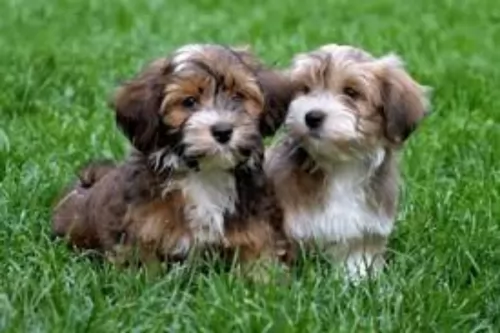 A very healthy breed, the Havanese doesn’t have a lot of health issues, but they are not immune to the problems of small breed dogs. The issues they do have are:
A very healthy breed, the Havanese doesn’t have a lot of health issues, but they are not immune to the problems of small breed dogs. The issues they do have are:
Your Toy Schnauzer has a life expectancy of 12 – 15 years if you care for them properly. They can, however, suffer from some health problems that so many other dogs might also have to contend with.
You’ll notice your pet's eyes taking on a filmy look. Most times these cataracts emerge in older dogs and they can be surgically removed.
Entropion and Progressive Retinal Atrophy (PRA) are other eye diseases that may affect your dog. Most dogs are able to adapt well to their limited vision and can even adapt to lost vision.
A bladder infection can be terribly uncomfortable for your pet and occurs when bacteria gets into the bladder. Females are more likely to get a bladder infection, but male dogs can pick up the infection too. Having a bladder infection increases the pet’s urge to urinate even when there is no urine to come out.
The little bit of urine that does come out may be cloudy or even have some blood in it. It is imperative to get your pet urgent veterinary attention. When you see your pet trying to urinate all the time with nothing happening, then this is the sign to get your dog to the vet for a course of antibiotics.
This is when food and liquid are retained in the dog's esophagus so that you find him regurgitating his food. This can lead to pneumonia.
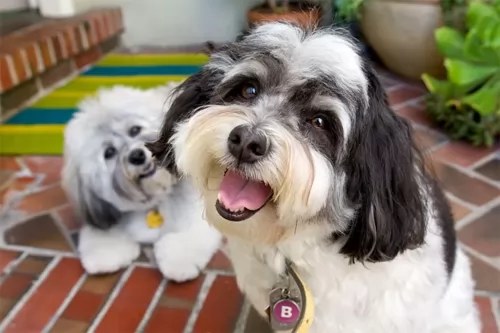 Feed 3 to 4 times per day a high quality dry puppy food for toy or small dogs. Feed ¼ to ½ cup each time.
Feed 3 to 4 times per day a high quality dry puppy food for toy or small dogs. Feed ¼ to ½ cup each time.
Remember these are small dogs and don’t overfeed. Feed a high quality dry food for small or toy dogs. Feed twice a day at about ½ cup each time.
The breed is generally very healthy.
This breed is not an overly active dog, but he does need some exercise. A nice walk once a day or a backyard to play in. They play inside as well as out. Don’t over exercise the Havanese. They do well in obedience and confirmation more so than agility or fly ball
Most people have their Toy Schnauzers professionally groomed on a regular basis. He is a double-coated dog with a wiry coat. Some people, looking to maintain the wiry texture do hand-stripping, certainly if the dog is used for show purposes.
No dog deserves to have dry kibble served up to him day after day. However, there are some excellent commercial dog foods on the market and you can choose the best one.
These foods provide a lot of convenience for the dog owner. Dogs also need to have their share of home-made food. It doesn’t have to be all complicated as dogs like simplicity.
Wholesome foods such as boiled chicken, brown rice and some nutritious vegetables such as sweet potatoes, spinach and carrots can do him the world of good. Schnauzers are also prone to pancreatis so you want to avoid giving him food that is high in fat.
Toy Schnauzers love an active lifestyle. They don't like sitting around inactive for too long.
Your Toy Schnauzer can adapt to life in the country or the city but he will certainly need to be well exercised. Walking your dog each day will be essential as will ball games and just generally giving your pet some of your attention,